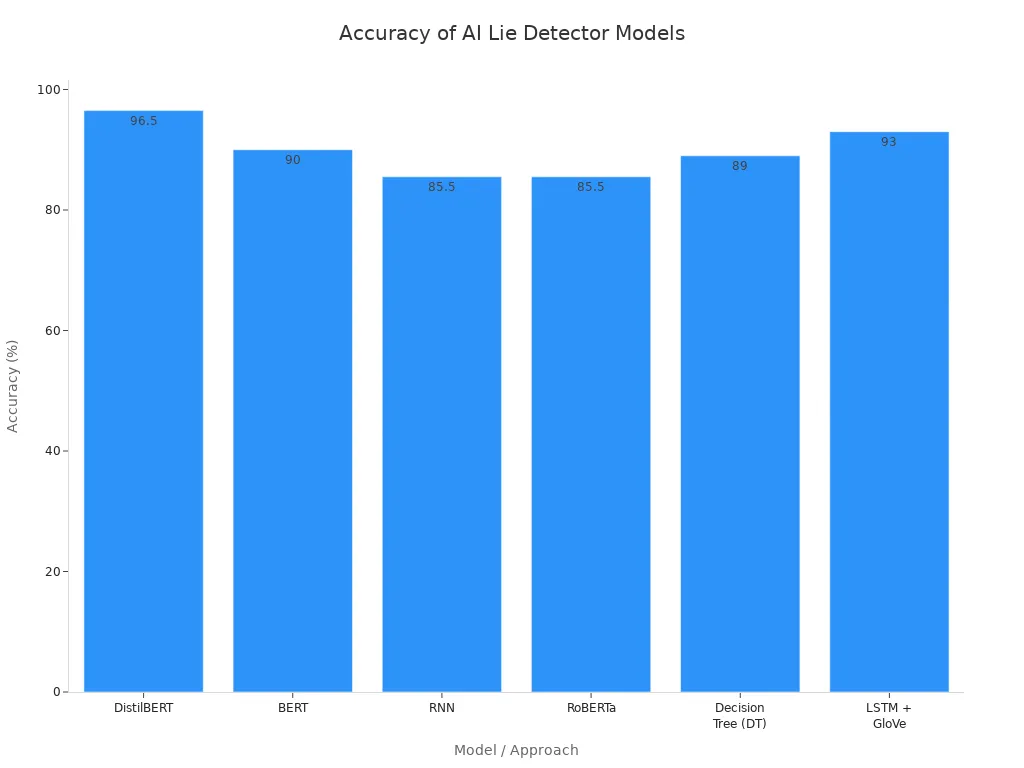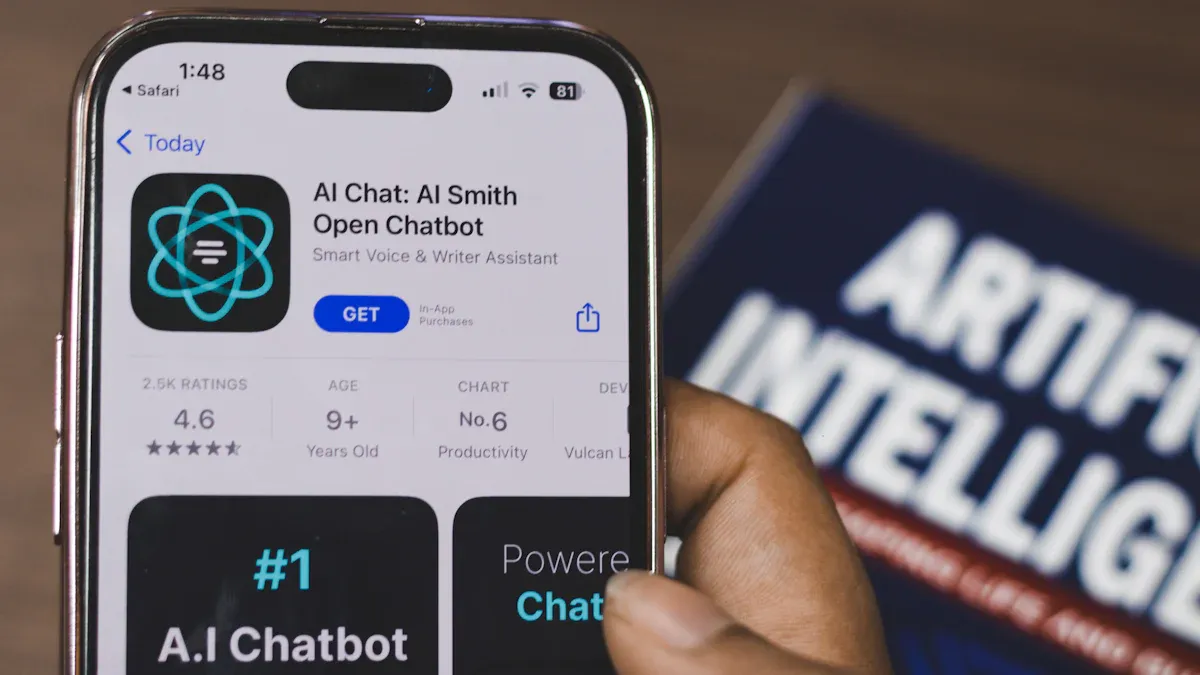
You want the best ai lie detector for 2025, right? Let’s look at the leaders: Gaslighting Check, Verity AI, and TruthScope. Each uses ai to spot lie patterns in real time. Gaslighting Check stands out with multi-modal analysis and strong privacy controls. Here’s a quick look at what these tools offer:
|
Analysis Type |
Focus Area |
Key Features |
|---|---|---|
|
Text Analysis |
Written communication |
Detects blame shifting and emotional invalidation |
|
Voice Analysis |
Vocal patterns |
Finds tone changes and emotional pressure |
|
Pattern Recognition |
Behavioral trends |
Tracks escalation and timing of manipulative tactics |
Accuracy, privacy, and ethical use matter most when you choose an ai lie detector.
Key Takeaways
-
Top AI lie detector apps use multi-modal analysis combining text, voice, and video to detect lies and manipulation more accurately.
-
Accuracy matters most; choose apps that share clear detection rates and explain how they avoid false positives.
-
Privacy and security are key; the best apps protect your data with encryption, consent controls, and follow strict laws like GDPR.
-
Pricing varies from free tools for quick checks to subscriptions for heavy use; pick a plan that fits your needs and budget.
-
Use AI lie detectors as helpful tools, not final judges; always apply your own judgment and respect legal and ethical rules.
Quick Comparison
Features Overview
When you look at the top ai lie detector apps, you’ll notice each one brings something unique to the table. Some focus on text, others on voice, and a few even check for gaslighting or emotional manipulation. Here’s a quick table to help you see how these apps stack up:
|
App Name |
Core Features |
Supported Platforms |
Integration Capabilities |
|---|---|---|---|
|
StudyPro |
High accuracy, multi-model detection, contextual breakdowns, free beta access |
Not explicitly detailed |
No LMS integration currently |
|
Turnitin AI Detection |
Institutional credibility, detects major AI models, confidence percentages, academic focus |
Not explicitly detailed |
LMS integration, institutional bulk screening |
|
Crossplag AI Detector |
Academic focus, plagiarism integration, percentage confidence, user-friendly reports |
Not explicitly detailed |
Plagiarism system integration |
|
BrandWell AI Checker |
Fast scanning, simple interface, token distribution analysis |
Not explicitly detailed |
No detailed integration mentioned |
|
Sapling AI Detector |
Decent accuracy on formal text, integrates with writing assistants |
Not explicitly detailed |
Integration with Sapling writing assistant |
|
Hugging Face Detector |
Open-source transparency, GPT-2 focused |
Not explicitly detailed |
No integration capabilities noted |
|
Corrector App Detector |
Free tool, quick results, basic binary classification |
Not explicitly detailed |
No integration capabilities noted |
You’ll see that some apps, like Turnitin AI Detection and Crossplag AI Detector, work best for schools or businesses. Others, like StudyPro, give you multi-model detection and a free beta to try out. If you want something simple, BrandWell AI Checker or Corrector App Detector might be your pick.
Accuracy Metrics
You want to know how well these ai tools spot ai-generated content, right? Detection accuracy matters a lot. Some apps claim almost perfect results, while others focus on explaining their decisions. Here’s a quick look at the numbers behind the most popular models:

DistilBERT leads with detection accuracy between 95% and 98%. BERT and LSTM + GloVe also do well, but older models like RNN and RoBERTa score lower. Most apps use these models to check for ai-generated content in text, voice, or even images. You’ll want to pick an app that uses the latest models for the best results.
Tip: Always check if the app shares its detection accuracy and how it tests for false positives. This helps you trust the results when you scan for ai-generated content.
Pricing and Platforms
You probably wonder how much these ai lie detector apps cost and where you can use them. Most apps work online, but some offer browser extensions or desktop versions. Pricing varies a lot:
-
Free Tools: Corrector App Detector and StudyPro (beta) let you try basic features at no cost.
-
Subscription Plans: Turnitin AI Detection and Crossplag AI Detector charge schools or businesses for bulk scanning and advanced reports.
-
Integration: Some, like Sapling AI Detector, work right inside your writing assistant, making it easy to check ai-generated content as you type.
If you need to scan lots of files or want deep analysis, you’ll likely pay more. For quick checks, free tools might be enough. Always look for apps that fit your workflow and budget.
Top AI Lie Detector Apps

Verity AI Overview
Verity AI gives you a powerful tool for spotting deception in real time. You get more than just text checks. This app uses advanced ai to scan for micro-expressions, voice stress, and even subtle behavioral cues. If you want to catch gaslighting or emotional manipulation, Verity AI stands out. It uses multi-modal analysis, which means it looks at video, audio, and written responses all at once. This approach helps you get a more accurate read, especially when you need content verification for sensitive conversations. Verity AI also supports integration with other platforms, so you can use it for ai-generated content checks in business, education, or personal settings.
TruthScope Features
TruthScope focuses on making content verification simple and fast. You can upload text, audio, or video, and the app’s ai will break down the results for you. TruthScope uses deep learning to analyze facial expressions, voice patterns, and even the timing of responses. If you’re worried about ai-generated content, TruthScope can flag suspicious segments and explain why. The dashboard gives you clear scores for each type of analysis, so you know exactly where to look for possible lies. TruthScope also offers a browser extension, making it easy to check content verification on the fly.
DeceptiGuard Review
DeceptiGuard takes a security-first approach. You get strong privacy controls and detailed reports. The ai in DeceptiGuard uses a mix of behavioral analysis and content verification to spot ai-generated content and manipulation. It checks for face liveness, voice anomalies, and even unusual typing patterns. DeceptiGuard works well for teams that need to review lots of files or conversations. You can set up custom alerts for certain types of ai-generated content, which helps you stay ahead of new tactics. The app also lets you export reports for compliance or audits.
Multi-Modal Analysis
You might wonder how these apps actually catch a lie. The secret is multi-modal analysis. These ai lie detector tools combine video, audio, and text to get a full picture. For example, the ai checks for micro-expressions—tiny facial movements that can reveal hidden emotions. It also listens for changes in your voice, like pitch or hesitation, using features such as mel-frequency cepstral coefficients. Some apps even track eye movement and blinking. When you combine all these signals, the ai can spot patterns that single-mode tools might miss. This makes content verification much more reliable, especially when you deal with ai-generated content that tries to mimic real people.
Tip: Multi-modal analysis boosts accuracy. If you want the best results for content verification, pick an app that uses video, audio, and text together.
User Experience
You want an app that feels easy to use, right? Verity AI and TruthScope both offer clean dashboards and step-by-step guides. You can drag and drop files or paste text for instant ai-generated content checks. DeceptiGuard gives you more advanced options, like batch uploads and custom alerts, which work well for business users. Most apps show you clear scores and highlight risky sections, so you don’t have to guess. If you need to share results, you can export reports or invite team members to review content verification findings together.
Privacy and Security
Privacy and security matter a lot when you use an ai lie detector. These apps handle sensitive data, including video, voice, and written responses. Top apps follow strict privacy rules, like GDPR and other international standards. They use privacy by default, which means you control what gets shared. You get opt-in consent, data anonymization, and automatic deletion of old files. Security by design is also key. Your data stays encrypted at rest, in transit, and even during processing. Role-based access controls limit who can see your results. The best apps also use real-time monitoring to catch threats and run regular audits to stay compliant. You can trust that your ai-generated content checks and content verification tasks stay private and secure.
-
Privacy By Default: opt-in consent, anonymization, auto-deletion
-
Security By Design: encryption everywhere, secure coding, threat detection
-
Access Controls: only the right people see your data
-
Compliance: GDPR, HIPAA (for health), EU AI Act, and more
Leading apps also focus on fairness and transparency. They run impact assessments and work to reduce bias, so your content verification results stay accurate and ethical. You get clear explanations for every ai-generated content flag, which builds trust.
Pricing Options
You have lots of choices when it comes to pricing. Some apps, like StudyPro, offer free beta access with full ai-generated content detection and writing help. This works great for students or anyone on a budget. Others, like Winston AI, use a subscription model with monthly fees and credit limits, which fits schools or businesses that need to scan lots of files. If you want to pay as you go, Copyleaks lets you buy credits for each content verification or ai-generated content scan. Originality AI charges per word and gives you team features, so you only pay for what you use.
|
App Name |
Pricing Model |
Key Features and Value at Price Points |
|---|---|---|
|
StudyPro |
Free during beta |
Integrated ai-generated content detection, writing tools, real-time feedback, content verification, ideal for students. |
|
Winston AI |
Subscription, monthly credits |
High-volume scanning, detailed reporting, best for institutions needing lots of content verification. |
|
GPTZero |
Subscription-based |
Reliable ai-generated content checks for individuals. |
|
Copyleaks |
Pay-as-you-go, subscriptions |
Multi-language, plagiarism integration, flexible for different content verification needs. |
|
Originality AI |
Per-word, team features |
Detailed analysis, team reporting, best for professional users and institutions. |
You should pick the pricing plan that matches your workflow. If you only need to check a few files, a free or pay-as-you-go option works. For heavy use or team projects, a subscription with advanced content verification features gives you more value.
Choosing an AI Lie Detector
Key Criteria
When you pick an AI lie detector, you want to focus on what matters most. Start with detection accuracy. If the tool can’t spot lies or fake content, it won’t help you. Look for apps that share clear detection accuracy numbers and explain how they test for mistakes. You also want strong content verification features. These help you check if text, voice, or video is real or manipulated. A good user interface makes a big difference, too. You should see clear results, easy-to-read scores, and simple steps for content verification. The best apps let you control the process, so you can review or override AI suggestions if needed.
Tip: Trust grows when you understand how the app makes decisions. Look for tools that show confidence levels and explain their reasoning in plain language.
Use Case Matching
Not every AI lie detector fits every job. Think about your needs. If you work in a school, you might want fast content verification for lots of files. For business, you may need detailed reports and batch scanning. Personal users often want quick checks and privacy. Some apps offer browser extensions for on-the-go content verification, while others focus on deep analysis for sensitive cases. Make sure the app matches your workflow and the type of content you handle. A tool that works for a teacher may not suit a security team.
Legal and Ethical Factors
You can’t ignore legal and ethical rules when using these tools. AI lie detectors handle sensitive data, so privacy laws matter. Top apps follow strict standards like GDPR and the EU AI Act. They use real-time monitoring and compliance checks to keep your data safe. Fairness and transparency are key. The best tools log every step, explain their decisions, and let you see who controls the process. They also set up guardrails to prevent bias or mistakes. If a tool skips these steps, you risk privacy problems, bias, or even legal trouble. Always choose apps that put ethics and safety first, especially for content verification in sensitive settings.
Pros and Cons

Strengths
You get a lot of value from AI lie detector apps. Here’s what stands out:
-
Speed and Convenience: You can check for lies or fake content in seconds. No need to wait for a human expert.
-
Multi-Modal Analysis: These apps look at text, voice, and video all at once. You get a more complete picture.
-
User-Friendly Dashboards: Most apps show results in a way that’s easy to understand. You see clear scores and risk levels.
-
Privacy Controls: Top apps let you control your data. You decide what gets shared or deleted.
-
Integration: You can use these tools with other platforms. This helps you fit them into your daily workflow.
Tip: If you want fast, accurate checks for deception, these apps make your life easier. You don’t need special training to use them.
Limitations
AI lie detector apps have some downsides you should know about:
-
False Positives: Sometimes, the app might flag honest content as suspicious. This can cause confusion.
-
Bias Risks: AI models can pick up bias from their training data. You might see unfair results in some cases.
-
Privacy Concerns: Even with strong controls, you still share sensitive data. Always check the app’s privacy policy.
-
Legal Uncertainty: Laws about AI lie detection change often. You need to stay updated to avoid trouble.
-
Limited Context: AI can miss subtle cues that a human would catch. It works best as a helper, not a replacement.
|
Limitation |
What It Means for You |
|---|---|
|
False Positives |
Double-check flagged content |
|
Bias Risks |
Watch for unfair patterns |
|
Privacy Concerns |
Review data handling policies |
|
Legal Uncertainty |
Stay informed on regulations |
|
Limited Context |
Use human judgment too |
Note: Always use AI lie detectors as a tool, not the final judge. Your own judgment still matters.
You’ve seen what the top AI lie detector apps can do. Verity AI shines for multi-modal analysis, TruthScope makes quick checks easy, and DeceptiGuard puts security first.
-
For personal use, try TruthScope for its simple dashboard.
-
For business, Verity AI gives you deep analysis.
-
For security teams, DeceptiGuard offers strong privacy.
Remember: Always check privacy settings and use these tools responsibly. Pick the app that fits your needs and values accuracy and ethics.
FAQ
How accurate are AI lie detector apps?
You can expect top apps to reach up to 98% accuracy in ideal conditions. Real-world results may vary. Always check the app’s reported accuracy and test it with your own data for best results.
Can I use these apps for personal conversations?
Yes, you can use most AI lie detector apps for personal chats, interviews, or video calls. Just make sure everyone knows you’re using the tool. Respect privacy and local laws.
Do these apps store my data?
Most leading apps let you control your data. You can choose to delete files or keep them private. Always review the privacy policy before uploading sensitive content.
Are AI lie detector results legally valid?
AI lie detector results usually do not hold up in court. You should use them as a guide, not as legal proof. Always check local laws before using these tools for official matters.
What devices work with AI lie detector apps?
You can use these apps on most devices. Many support web browsers, desktops, and mobile phones. Some even offer browser extensions for quick checks. Check the app’s website for supported platforms.








